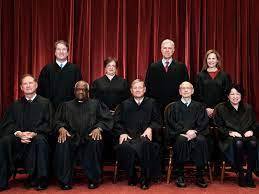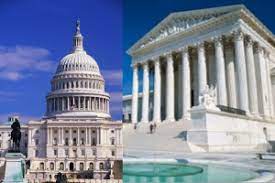administrative law
West Virginia v. EPA: A Quick Explainer
This video lays out the issues, what the Court did, and where EPA can go from here.
CONTINUE READINGThe Supreme Court Curbs Climate Action
The ruling in West Virginia v. EPA was about as good as we could expect given the makeup of the Court.
Today, the Supreme Court decided its most important environmental case since 2007. We didn’t dodge the bullet. It’s more than a flesh wound but it didn’t hit any vital organs . Chief Justice Roberts’s majority opinion leaves EPA other options to reduce carbon emissions from coal-fired power plants. It also gives a fairly narrow reading …
Continue reading “The Supreme Court Curbs Climate Action”
CONTINUE READINGTwo FERC Cases and Why They Matter
Last week’s D.C. Circuit cases illustrate why environmental lawyers need to understand FERC.
The Federal Energy Regulatory Commission (FERC) has been called the most important environmental agency that no one has heard of. At the end of last week, the D.C. Circuit decided two undramatic FERC cases that illustrate FERC’s environmental significance. One involved a bailout to coal and nuclear plants, the other involved water quality. The first …
Continue reading “Two FERC Cases and Why They Matter”
CONTINUE READINGSmoke But No Fire
No, the draft Supreme Court abortion decision doesn’t threaten the standing of environmental groups
The implications for environmental law are far from being the most important aspect of the leaked draft of a Supreme Court opinion overruling Roe v. Wade. The aggressiveness of the opinion in the Dobbs case signals a kind of activism that is definitely worrisome in other areas. At the end of last week, however, there …
Continue reading “Smoke But No Fire”
CONTINUE READINGClarifying the Congressional Review Act
The Ninth Circuit rules on the preclusive effect of a CRA disapproval in a wilderness protection case.
Soon after Trump took office, Republicans used the Congressional Review Act (CRA) to overturn sixteen Obama-era regulations. If they win control of the government in 2024, they’ll undoubtedly do the same thing to Biden regulations. It behooves us, then, to understand the effect of these legislative interventions. A Ninth Circuit ruling last week in a …
Continue reading “Clarifying the Congressional Review Act”
CONTINUE READINGThe Black Box of OIRA
OIRA oversees the whole regulatory state. We probably know more about the inner workings of the CIA.
The Office of Information and Regulatory Affairs (OIRA) oversees government regulation across the federal government. Some portray it as a guardian of rationality, others as biased in favor of industry. Public information about OIRA is so limited that it’s impossible to know one way or the other, due to the veil of secrecy that surrounds …
Continue reading “The Black Box of OIRA”
CONTINUE READINGJustice Breyer’s Nuanced Voice in Environmental Law
In a thoughtful, undramatic way, Breyer has turned out to be a valuable supporter for environmental regulation.
Given Justice Breyer’s announced retirement, it seems like a good time to assess his contribution to environmental law. When Bill Clinton nominated him for the Supreme Court, there was a great deal of uneasiness among environmentalists about Justice Breyer. As an academic, he had sounded a cautious note about government regulation, calling for more deliberation …
Continue reading “Justice Breyer’s Nuanced Voice in Environmental Law”
CONTINUE READINGMore on How the Vaccine Mandate Cases May Impact Climate Policy
How much is the Court likely to prune back EPA’s powers?
In a Friday post, I sketched some thoughts about how the Supreme Court’s vaccine mandate rulings might impact EPA’s power to control carbon emissions. I think it’s worth unpacking both the Court’s opinions a little more and the issues at stake in a pending climate change case, West Virginia v. EPA. The Court ruled in …
Continue reading “More on How the Vaccine Mandate Cases May Impact Climate Policy”
CONTINUE READINGMajor Questions About the Major Questions Doctrine
You may not have heard of this doctrine but it’s a big threat to innovative regulations.
Unless you’re deeply immersed in administrative law, you may not have heard of the major questions doctrine. It’s a legal theory that conservative judges have used with increasing rigor to block important regulatory initiatives. The doctrine places special obstacles on agency regulations of issues of “major economic and political significance.” In its initial outing, the …
Continue reading “Major Questions About the Major Questions Doctrine”
CONTINUE READINGA Bad Week for Biden, and for Climate Action
First House progressives, and next conservative Justices, poked a stick in the spokes.
President Biden hoped to go to the international climate summit in Glasgow with momentum behind him. He wanted to reestablish US credibility with concrete progress on climate change. Instead, the ability of the US to take action on climate change is shrouded in doubt. Biden suffered an embarrassing defeat at the hands of members of …
Continue reading “A Bad Week for Biden, and for Climate Action”
CONTINUE READING












